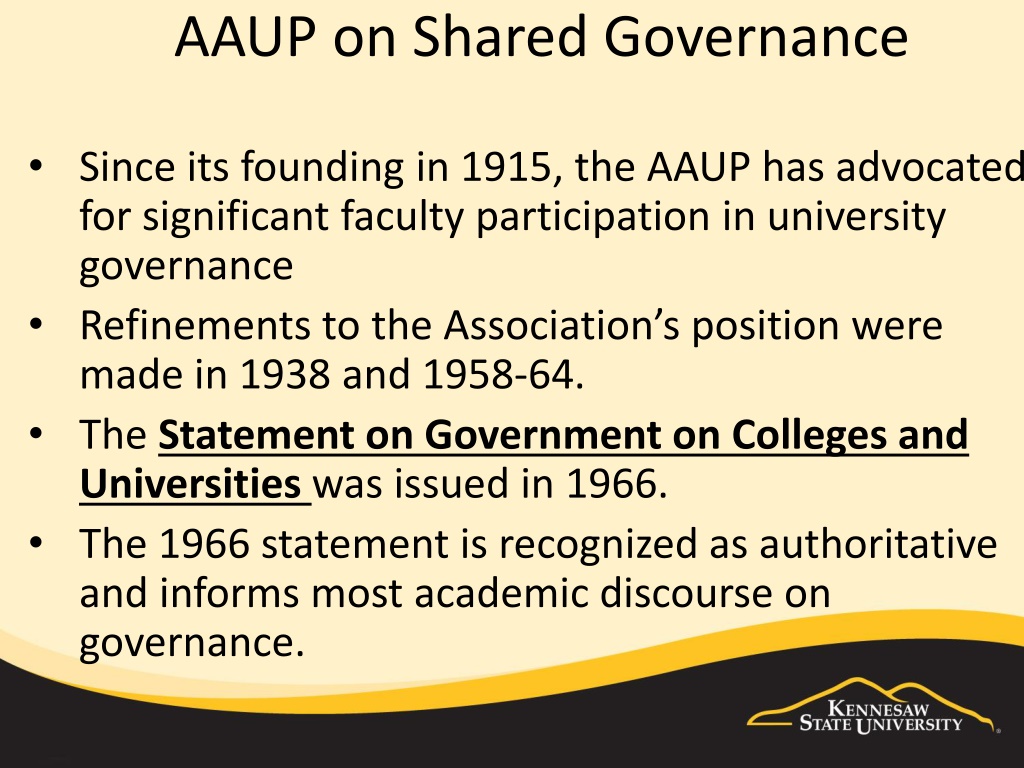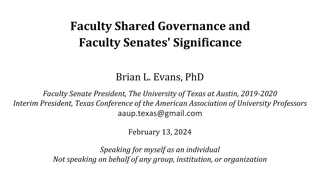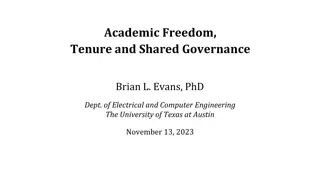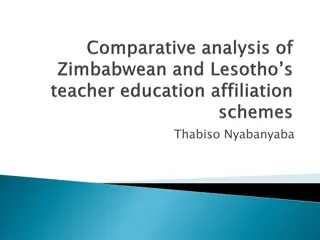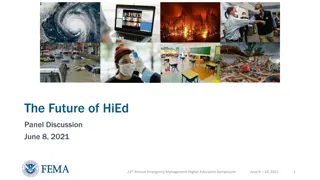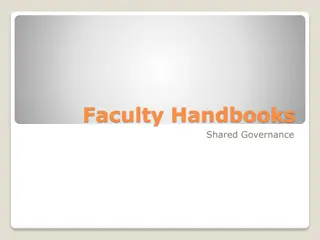Evolution of Shared Governance in Higher Education
The American Association of University Professors (AAUP) has long advocated for faculty participation in university governance. The 1966 Statement on Government of Colleges and Universities, endorsed by AAUP, ACE, and AGB, emphasizes shared governance for effective communication and joint planning among governing boards, administration, faculty, and students. Roles of governing boards, administration, and faculty are articulated, highlighting the importance of collaborative decision-making based on responsibility levels.
Download Presentation

Please find below an Image/Link to download the presentation.
The content on the website is provided AS IS for your information and personal use only. It may not be sold, licensed, or shared on other websites without obtaining consent from the author. Download presentation by click this link. If you encounter any issues during the download, it is possible that the publisher has removed the file from their server.
E N D
Presentation Transcript
AAUP on Shared Governance Since its founding in 1915, the AAUP has advocated for significant faculty participation in university governance Refinements to the Association s position were made in 1938 and 1958-64. The Statement on Government on Colleges and Universities was issued in 1966. The 1966 statement is recognized as authoritative and informs most academic discourse on governance.
1966 Statement on Government of Colleges and Universities Jointly formulated by the AAUP, the American Council on Education (ACE), and the Association of Governing Boards of Universities and Colleges (AGB) AAUP endorsed the statement. ACE and AGB recognize[d] the statement as a significant step forward in the clarification of the respective roles of governing board, faculties, and administrations and commended the statement to their member institutions.
Statement on Government of Colleges and Universities: Recommends shared or joint governance because: [t]he variety and complexity of the tasks performed by institutions of higher education produce an inescapable interdependence among governing board, administration, faculty, students, and others. The relationship calls for adequate communication among these components, and full opportunity for appropriate joint planning and effort.
Appropriate joint planning and effort requires participation depending on the degree of responsibility: differences in the weight of each voice, from one point to the next, should be determined by reference to the responsibility of each component for the particular matter at hand The statement articulates the roles of three components: Governing Board Administration Faculty
On the role of the Governing Board: Ensures the University stays true to its mission Plays a major role in ensuring that the institution has the financial resources in needs to operate successfully Possesses final decision-making authority Entrusts the conduct of administration to the administrative officers Entrusts the conduct of teaching and research to the faculty
On the role of the President: Is the chief executive officer of the institution Ensures that the operation of the institution conforms to the policies set forth by the governing board, and to sound academic practice Provides institutional leadership Makes sure there is effective communication between components of the institution Represents the institution to its many publics
On the role of the Faculty: Essentially, the faculty has responsibility (voice and decision-making authority) for matters in proportion to the degree of their expert knowledge. Therefore The faculty has primary responsibility for such fundamental areas as curriculum, subject matter and methods of instruction, research, faculty status, and those aspects of student life which relate to the educational process.
Faculty status and related matters are primarily a faculty responsibility; this area includes appointments, reappointments, decisions not to reappoint, promotions, the granting of tenure, and dismissal. Has oversight over admissions Sets requirements for degrees Determines when degree requirements have been met
Why should the faculty voice be authoritative in the academic area? Faculty are distinctly qualified to exercise decision- making authority in their areas of expertise The faculty s judgment is central to general educational policy [1966 statement] scholars in a particular field or activity have the chief competence for judging the work of their colleagues [1966 statement]
In areas where the faculty doesnt have primary responsibility, the faculty still participate in decision- making. These areas include: Long range planning Hiring and evaluation of administrators Physical plant Budget
On carrying out faculty responsibilities: Agencies for faculty participation in the government of the college or university should be established at each level where faculty responsibility is present. An agency should exist for the presentation of the views of the whole faculty. Faculty representatives should be selected by the faculty according to procedures determined by the faculty.
What is Shared Governance From: Gary Olson, 2009. Chronicle of Higher Ed* Shared governance is a delicate balance between faculty and staff participation in planning and decision-making processes, on the one hand, and administrative accountability on the other. * http://chronicle.com/article/Exactly-What-Is-Shared/47065/
What is Shared Governance From: Gary Olson, 2009. Chronicle of Higher Ed* The key to genuine shared governance is broad and unending communication. When various groups of people are kept in the loop and understand what developments are occurring within the university, and when they are invited to participate as true partners, the institution prospers. That, after all, is our common goal. * http://chronicle.com/article/Exactly-What-Is-Shared/47065/
What is Shared Governance From: Gary Olson, 2009. Chronicle of Higher Ed* Shared governance means that people accept their responsibilities to look at information objectively, take a wider view than that of the individual, to understand the constraints we operate under. Shared governance takes work. * http://chronicle.com/article/Exactly-What-Is-Shared/47065/
Local shared governance: DFCs and CFCs Guiding principles of these councils: Communication: the main point of the councils is to provide a basis for improving it. Transparency: Chairs and Deans final decision-making authority is crystal clear; at the same time they are expected to operate as transparently as possible with the elected representatives of their faculty. Legitimacy: the Faculty Councils have a right, even a duty, to consult their Chair s (or Dean s) supervisor if their rights of consultation and/or their access to information are not respected.
Guidance re DFCs and CFCs (from Section Three) This unequivocal statement also means that the chair has no grounds to withhold information from or to fail to consult because she fears her authority may be undermined. http://kennesaw.edu/handbooks/documents/UH2015-2016.30June15.pdf
Guidance re DFCs and CFCs (from Section Three) The DFC is an elected body that is separate from a department's administrative committee, and may meet without the chair or the chair's appointees. http://kennesaw.edu/handbooks/documents/UH2015-2016.30June15.pdf
Guidance re DFCs and CFCs (from Section Three) http://kennesaw.edu/handbooks/documents/UH2015-2016.30June15.pdf
Guidance re DFCs and CFCs (from Section Three) The DFC has a right to such information. In the event the chair will not provide access the DFC may appeal to the Dean and should inform the Ex Comm of the Faculty Senate. http://kennesaw.edu/handbooks/documents/UH2015-2016.30June15.pdf
Guidance re DFCs and CFCs (from Section Three) A DFC is not limited to meetings called by the chair. semester and let colleagues, including the chair, know it is doing so. It should meet at least twice a http://kennesaw.edu/handbooks/documents/UH2015-2016.30June15.pdf
Guidance re DFCs and CFCs (from Section Three) The DFC should make these arrangements clear to the chair annually, and stress that it expects to be consulted over the summer just as during the academic year. No "summer surprises!" http://kennesaw.edu/handbooks/documents/UH2015-2016.30June15.pdf
